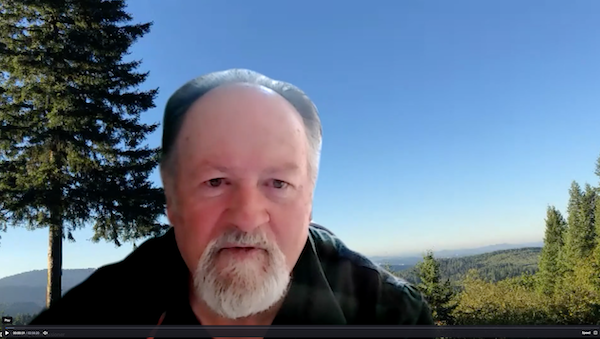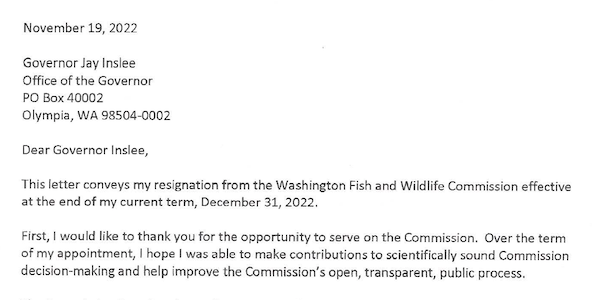McIsaac To Resign From WA Fish & Wildlife Comm At Year End
Don McIsaac will resign from the Washington Fish and Wildlife Commission at the end of his term, this New Year’s Eve, rather than seek reappointment.

In a letter sent Saturday, McIsaac thanked Governor Inslee for the chance to serve on the citizen panel that sets WDFW policy and hires its director, said he hoped he contributed “to scientifically sound Commission decision-making” as well as had helped better its “open, transparent, public process.”
The odds that the governor would reappoint the rural Clark County resident who has been a solid supporter of hunting and fishing – commercial more so than sport fishing, it can be said – were slim to begin with as the Governor’s Office shifts the commission towards a more preservationist tack.
Still, McIsaac went out on his own terms, his letter was cordial and he expressed an appreciation for working with fellow commissioners.
“All that I have served with have had their hearts are (sic) in the right place trying to serve as proper policy-level stewards of our State’s valuable fish and wildlife resources, and have worked long hours towards that goal,” he contended.

McIsaac praised WDFW employees at further length, calling staffers’ performance “admirable, from the Department Director dealing with a myriad of executive challenges to the seasonal fish checkers collection biological data at the docks.”
“They have shown inspirational dedication to the protection, conservation, and wise management of the State’s valuable natural resources while at the same time demonstrating a constructive, positive attitude when working with the people of the State they serve,” he wrote.
Just as the last resignee, Fred Koontz in December 2021 after just 11 months, had advice for Inslee on his replacement, McIsaac had some thoughts.
He said the commission “functions best” at full strength of nine – a reference perhaps to the Governor’s Office having left the board at eight members for an extended period which also saw former chair Larry Carpenter kept in his seat well past the expiration of his term and the members tie 4-4 on the spring bear question, one way to put the special permit season on pause.
“Just as the broad spectrum of biodiversity provides stability and strength to a robust natural ecosystem, a Commission composed of informed individuals with diverse opinions and different areas of specialized expertise in the field of natural resources conservation and management can provide stability and success to fulfilling the Commission’s legislative mandate. I urge you consider such diversity as you consider the future of the Commission,” McIsaac wrote.
That edict from state lawmakers was on his mind this past Friday as the commission voted 5-4 to ban the “recreational” hunting of bears in spring.
“Going to zero is not in the mandate of the commission,” McIsaac stated.
The resignation letter was first posted last night on Hunting-Washington forum. On Facebook this morning, Washingtonians for Wildlife Conservation also posted the news.
“We want to thank Commissioner McIsaac for his work and dedication on the WDFW Commission. He brought thoughtful contributions to the discussion, and defended North American Model of Wildlife Conservation,” WWC stated. “Please join us in saying THANK YOU!”
As it became clear that southern resident killer whales weren’t finding enough Chinook to eat and the state of Washington ramped up efforts to do something about it, McIsaac led calls to boost hatchery production by 50 million smolts a year, a move that would also have “shirttail benefits” for fishermen. Releases, both state and federal, have in fact been ramped up sharply but they’re also the subject of lawsuits in various courts.
On a related front, he drew praise from longtime Washington sportfishing advocate Frank Urabeck for working on an update to hatchery management policies.
“Don’s work producing new Commission Hatchery Policy C-3624 was game-changing, impacting much of what is in play for salmon and steelhead management,” said Urabeck.
Before he goes into the sunset, McIsaac will chair a meeting of the commission’s Fish Committee that will look at this season’s Buoy 10 and Lower Columbia fall salmon fishery, which saw fishing shut down early all the way up to Bonneville Dam after high impacts on tule Chinook in the estuary during the sport season. That is slated for Wednesday, November 30.
And the full commission will also meet in Clarkston December 8-10.
McIsaac was appointed to the commission in August 2017. Before that he served for 16 years as the director of the Pacific Fishery Management Council, which oversees the management of West Coast salmon, tuna, rockfish, baitfish and other nearshore and highly migratory species.


